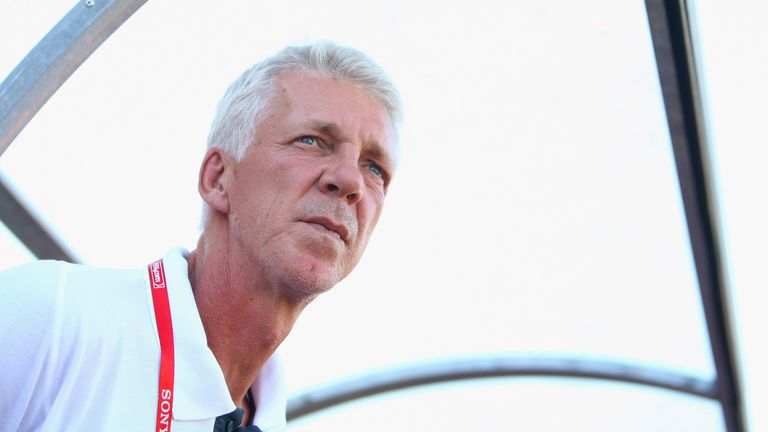In this exclusive interview, Thomas Rongen opens up on becoming the subject of a new Hollywood movie starring Michael Fassbender and the story that inspired it. On embracing world’s worst team American Samoa and dealing with personal tragedy in the process

Image: Thomas Rongen's story is even more remarkable than the one depicted on screen in new Hollywood movie Next Goal Wins
The redemption tale of the world’s worst football team is currently captivating audiences around the world. Next Goal Wins is the story of how American Samoa, having previously lost 31-0 to Australia, would finally win their first match in 30 years.
It is the story of goalkeeper Nicky Salapu, persuaded to return after that harrowing defeat and winning the admiration of his son. It is the story of Jaiyah Saelua, the first trans woman to compete in a World Cup qualifier. It is also the story of Thomas Rongen.
“It has been a badass ride,” Rongen tells Sky Sports. The Dutchman who left Amsterdam as a young man for a new life in the United States, Rongen is the villain of Taika Waititi’s movie, as portrayed by Michael Fassbender, but a hero of the true story that inspired it.
YouTube Due to your consent preferences, you’re not able to view this. Open Privacy Options
In just three weeks, this once celebrated coach, who had won the MLS Cup in 1999, turned this team into winners. His time on the island is about how he changed them but also about how its people changed him, helping him to confront his own personal tragedy.
American Samoa did not just change his life. It saved it.
“I had tried to take my life twice,” he says, matter-of-factly. His stepdaughter Nicole had died aged 19 in a car accident in 2004. There was unresolved trauma for Rongen. His wife institutionalised him. “Thank God,” he says. “I am totally beyond that right now.”
The turning point came in Polynesia. “It was a huge reset button for me. A lot of personal healing happened because of these beautiful people in American Samoa. They taught me to realise what is important in life and that also rekindled my love of the game.”
Earlier in 2011, Rongen had been fired for the first time. “I was in such a bad place. I was driven by fear of failure. I had loved the game. I lost that somewhere down the line in the cynical professional environment.” He was persuaded to take a new challenge.
He held out no great hopes. He did not even know where American Samoa was on the map. “To be really honest with you, I did not go there with the mindset of winning, quite frankly.” And yet, how he achieved that remains a source of fascination over a decade on.
“Other foreign coaches had not respected their culture, first and foremost. I feel that was huge in endearing me to the players. Dutch people, we are fairly liberal. We like to learn other cultures. Everything fell into place from there, personally and professionally.”
Rongen highlights two decisions that would prove critical.
One was instinctive but impactful. On the first day of training, he had noticed that the centre-back whose passport read Johnny was being routinely referred to as Jaiyah by her team-mates. This was men’s football but she appeared to identify as a woman.
“I said: ‘Your passport says Johnny but I can hear the group calling you Jaiyah. What do you want me to call you?’ She said: ‘Coach, if you could call me Jaiyah.’ Without even thinking, I said: ‘Absolutely. You are Jaiyah.’ She told me I was the first coach to accept her.
“But it was the response of the group. Because the third-gender community is largely accepted across Polynesia, they all hugged us both. That broke the ice. This was a guy who accepts who we are. It endeared me to the players. We became very united.”

Image: Rongen, Jaiyah Saelua and Nicky Salapu pictured together in 2014
The other significant decision was that on that same day Rongen was able to announce that he had convinced goalkeeper Salapu to make his return to the team. The coach had read articles about what the player had been forced to deal with in the aftermath.
“He claimed that he would beat Australia 32-0 on FIFA every night. He also told a story about walking down the street and people asking him if he was the goalkeeper in the 31-0 game. He said his son thought he was a loser.” It could not be the end of his story.
“I watched that game. I am telling you if it were not for him it could have been 50. I pretty much promised him we would win. I think my conviction persuaded him. I told him his son would think he was a hero. It became this incredible thing. Let’s do it for Nicky.”
For Rongen, the two decisions were entirely logical but they were also critical. “There is no doubt in my mind,” he says. “Those two situations came about spontaneously but they allowed us to be a united front from pretty much the day I came off the plane.”
If those decisions instantly transformed the mood among the team, American Samoa transformed him almost as quickly. He describes himself as an atheist but after joining his team in church experienced what he calls a “wild spiritual ride” on the island.
“By the third day, my heart rate came down and I experienced certain things that led to me crying. My personal healing started. I began to look at things in a different way. Go with the flow. Be happy. It is not win at all costs. They taught me emotional intelligence.”

Image: Rongen had his own demons to confront during his time in American Samoa
Together, they made history. Tonga were beaten 2-1. Only a one-goal defeat to Samoa ended their World Cup adventure. “I looked in their eyes and for the first time I felt they believed they could win. That was the biggest victory.” Bottom of the rankings, no more.
Salapu, the once beleaguered goalkeeper, had his redemption moment. Shortly after the historic victory against Tonga, the young son who had once seen him as a loser, now told his father that he was his hero. “He cried. I cried. That was a rewarding moment.”
Hollywood covers that part of the story – but with a twist. “The movie is a lot different,” says Rongen. He is careful not to criticise too much and has played an active part in promoting the picture but Fassbender’s portrayal is rather less sympathetic than the reality.
“When I first saw the movie alone in a big theatre in Miami where I live, I walked out with my head shaking, confused,” acknowledges Rongen. “It threw me off in the first scene and I could not catch up. They intertwine the death of my daughter. It was just crazy.”
In Toronto, he had words with the director. “I confronted Taika after a few drinks. I told him, ‘You’re killing me’. He told me, ‘I needed a villain and you were just the obvious one’. Most people are going to walk out of the theatre and think, ‘This guy Rongen is a d***’.

Image: Rongen, Jaiyah Saelua and Taika Waititi promote Next Goal Wins in Toronto
The truth is that the bond between that American Samoa team and their coach is as strong as it gets. Rongen highlights that in his own inimitable way. “I played for 10 teams in the old NASL,” he points out, including the Los Angeles Aztecs alongside Johan Cruyff.
“I was a youth coach for five years. A college coach. I coached four teams in MLS. I went to three U20 World Cups. I was head coach of the Olympic team. I am wearing my MLS championship ring that I won with DC United in 1999. I touched thousands of players.
“But I stay in touch more with the players from American Samoa than with any other team. That tells you a lot. There is a connection.”
There could even be an unlikely sequel.
Now 67, Rongen makes his living as an analyst covering Lionel Messi’s Inter Miami. But there has been an offer to return and coach American Samoa in their qualifying campaign for the 2026 World Cup. “They have asked me and I am pondering it,” he admits.
“I told Jaiyah and Nicky and they want to play again. Let’s bring the band back together,” he laughs. But seconds later, he is being seduced by a script even Hollywood would baulk at. “There has been a marked improvement. If we could get through the first phase…”
He adds: “Maybe you get second place and make the playoff to get to the United States. That is far-fetched but we will see. The mere fact that I am contemplating it at nearly 68 tells you that this place rekindled a love for the game that was absolutely dead.”
That is for the next film. For now, the story of Thomas Rongen’s first stint in charge of American Samoa is special enough. “I hope that people take more from the movie than the experience of just watching a sports film.” How could they not?
Sourse: skysports.com






